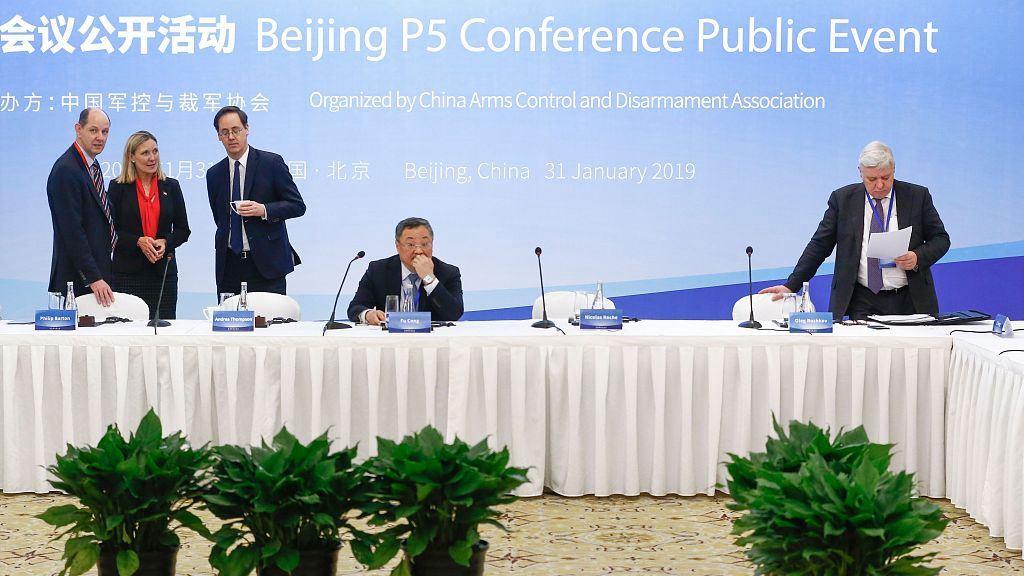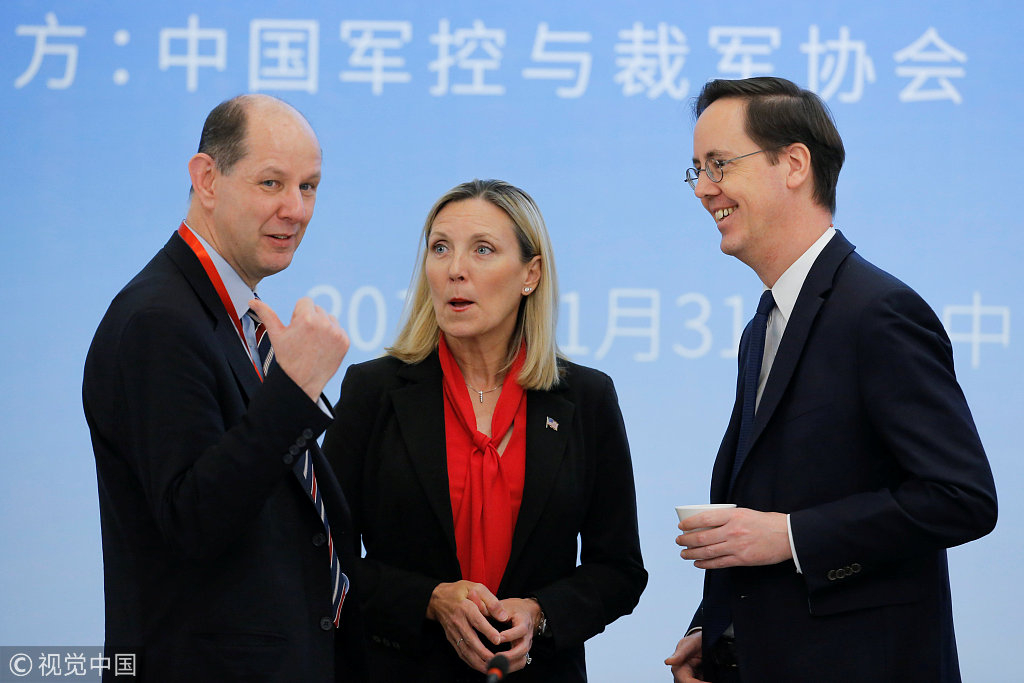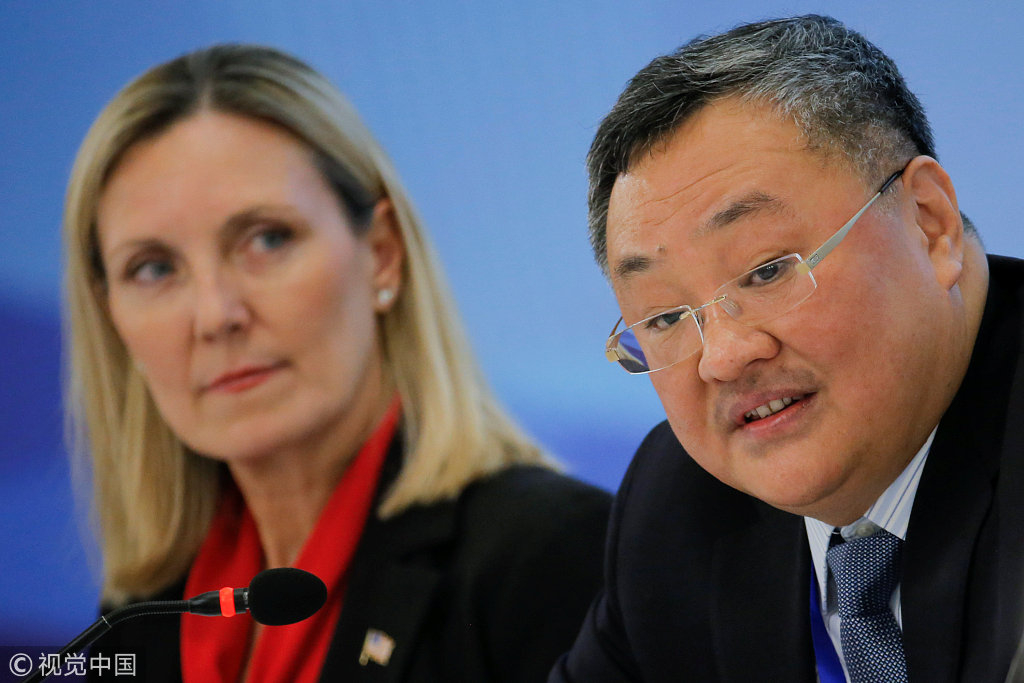
Opinion
23:02, 31-Jan-2019
Five nuclear powers strive to structure a safe world
Wang Li

Editor's note: Wang Li is a professor at Jilin University. The article reflects the author's opinion, and not necessarily the view of CGTN.
On January 30, 2019, the five nuclear powers (the P5) – China, Russia, France, the UK and the U.S. – met in Beijing with a view to discussing their coordination and safeguarding of the Treaty on the Non-Proliferation of Nuclear Weapons (NPT).
Due to the fact that the P5 are also the permanent members of the UN Security Council, the world is surely concerned about whether the Beijing Conference reaffirmed the P5's commitments to arms control and non-proliferation obligations.
The P5 have greater leverage in world affairs than many other countries in terms of their military, political and economic capacities.
It is thereby vital for them to agree to strive for greater progress in nuclear disarmament, do their utmost to resolve the nuclear non-proliferation issue through political and diplomatic measures, and enhance international cooperation in the peaceful use of nuclear energy, which is regarded as the three essential goals of the NPT.
To that end, the P5 is expected to enhance exchanges on nuclear policies and strategies so as to prevent nuclear risks caused by misperception and misjudgments.

Delegation members from the UN Security Council's five permanent members (P5) attend a panel discussion after a Treaty on the Non-Proliferation of Nuclear Weapons (NPT) conference in Beijing, January 31, 2019. /VCG Photo
Delegation members from the UN Security Council's five permanent members (P5) attend a panel discussion after a Treaty on the Non-Proliferation of Nuclear Weapons (NPT) conference in Beijing, January 31, 2019. /VCG Photo
For historical reasons, the P5 is the legal nuclear weapon states recognized by the NPT. Yet, other nuclear-armed states and some other countries have stayed out of the treaty negotiations.
So far, both the P5 and non-P5 nuclear-armed states have made progress towards nuclear disarmament, but the non-nuclear weapon states are not satisfied with the pace of progress. They have pushed for more radical measures towards the nuclear-weapon-free world and asked for the right of peaceful use of nuclear energy.
Internationally, a durable peace can be achieved only through consensus among the great powers in seeking common security and maintaining global stability.
As the NPT is the cornerstone of the global nuclear non-proliferation system, UN Secretary-General António Guterres has reiterated that “the P5 should continue their efforts to take responsibility to maintain global strategic stability, to safeguard non-proliferation regime, and to continue the nuclear disarmament.”
China has been committed to comprehensively implement the NPT. Also, it has made all the efforts to address divisions between nuclear-armed countries and many other states which ask for the legitimacy of the peaceful use of nuclear energy.

U.S. Under Secretary of State Andrea Thompson (L) and Director General of the Department of Arms Control and Disarmament of the Chinese Foreign Ministry Fu Cong attend a panel discussion after a Treaty on the Non-Proliferation of Nuclear Weapons (NPT) conference in Beijing, January 31, 2019. /VCG Photo
U.S. Under Secretary of State Andrea Thompson (L) and Director General of the Department of Arms Control and Disarmament of the Chinese Foreign Ministry Fu Cong attend a panel discussion after a Treaty on the Non-Proliferation of Nuclear Weapons (NPT) conference in Beijing, January 31, 2019. /VCG Photo
In the cases of the DPRK and Iran, China has followed the UN resolutions and the NPT, viewing the UN-endorsed sanctions on the DPRK as necessary, but arguing that sanctions alone would not end the nuclear crisis on the Korean Peninsula.
Equally, since the U.S. announced pulling out of the Joint Comprehensive Plan of Action (JCPOA) which was struck in 2015, China has made all efforts to maintain the implementation of JCPOA.
Beijing has warned that any breakup in this Iran nuclear deal would lead the Middle East towards the problems like nuclear proliferation and has worked responsibly with Russia, Germany, France and Britain on the agreement.
China' stance on the nuclear issue is consistent and transparent. During a speech at the United Nations in 2017, President Xi Jinping called for a final comprehensive ban on nuclear weapons in order to make the world free of nuclear weapons.
As a staunch holder of multilateralism, China is committed to upholding the purposes and goals of the NPT with a belief that all countries should be committed to the peaceful use of nuclear energy in light of the NPT.
Although China is one of the P5, it has always argued for upgrading global security governance and rebuilding a community with a shared future for mankind.
This is the reason why together among the P5 along with all the countries, the world never breaks.
(Cover Photo: Delegation members from the UN Security Council's five permanent members (from left) Philip Barton of the United Kingdom, Andrea Thompson of the U.S., Nicolas Roche of France, Fu Cong of China, and Oleg Rozhkov of Russia attend a panel discussion after a Treaty on the Non-Proliferation of Nuclear Weapons conference in Beijing, January 31, 2019. /VCG Photo)
(If you want to contribute and have specific expertise, contact us opinions@cgtn.com)

SITEMAP
Copyright © 2018 CGTN. Beijing ICP prepared NO.16065310-3
Copyright © 2018 CGTN. Beijing ICP prepared NO.16065310-3